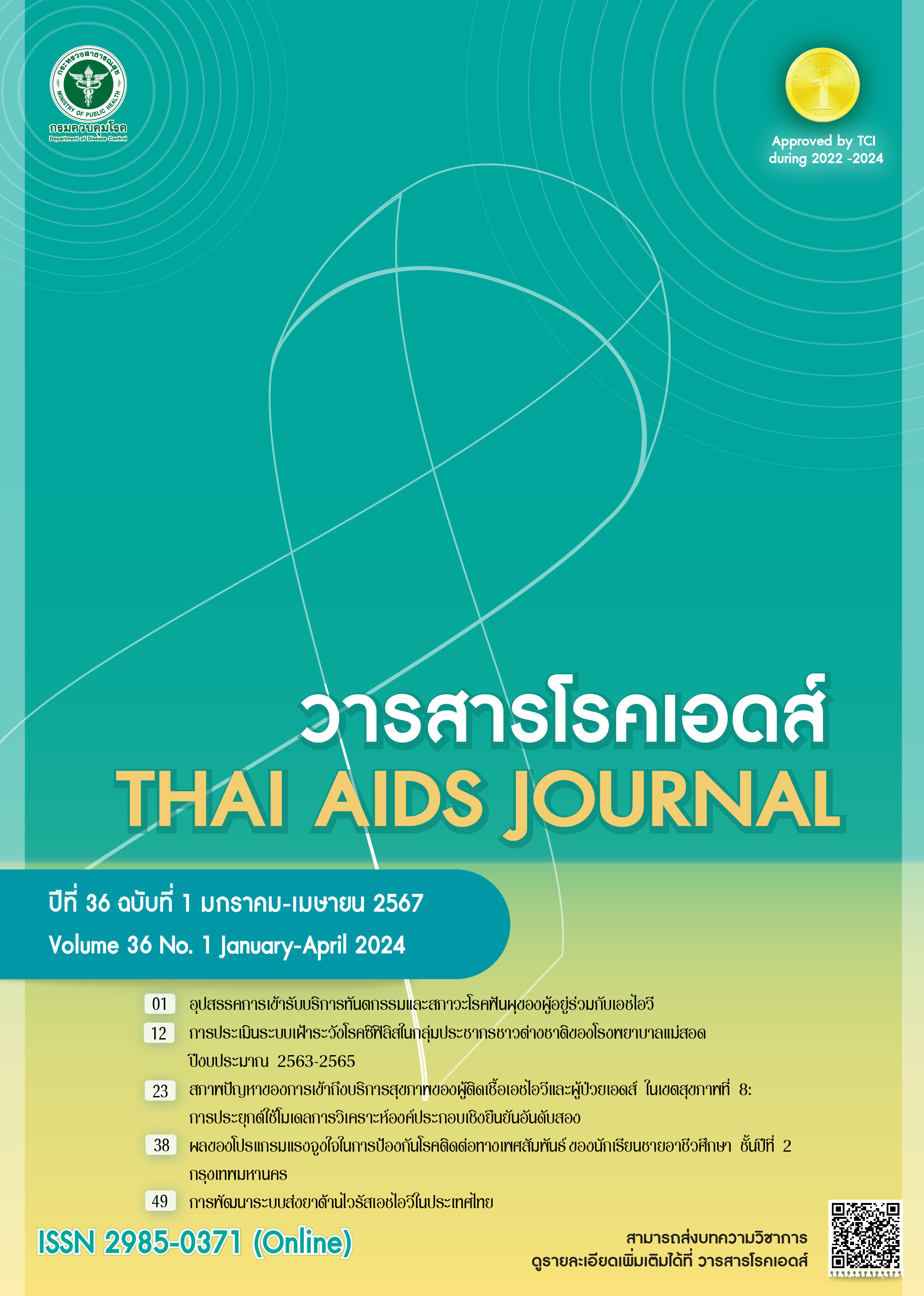ผลของโปรแกรมแรงจูงใจในการป้องกันโรคติดต่อทางเพศสัมพันธ์ของนักเรียนชายอาชีวศึกษา ชั้นปีที่ 2 กรุงเทพมหานคร
DOI:
https://doi.org/10.14456/taj.2024.4คำสำคัญ:
โปรแกรมแรงจูงใจ, โรคติดต่อทางเพศสัมพันธ์, นักเรียนชายอาชีวศึกษาบทคัดย่อ
การวิจัยกึ่งทดลองครั้งนี้ มีวัตถุประสงค์เพื่อศึกษาผลของโปรแกรมแรงจูงใจในการป้องกันโรคติดต่อทางเพศสัมพันธ์ กลุ่มตัวอย่าง คือ นักเรียนชายอาชีวศึกษา ระดับประกาศนียบัตรวิชาชีพ ชั้นปีที่ 2 จำนวน 68 คน จากวิทยาลัยอาชีวศึกษา 2 แห่ง ในกรุงเทพมหานคร แบ่งเป็น 2 กลุ่ม ได้แก่ กลุ่มทดลอง และกลุ่มเปรียบเทียบ กลุ่มละ 34 คน กลุ่มทดลองได้รับกิจกรรมตามโปรแกรมเป็นระยะเวลา 8 สัปดาห์ โดยจัดกิจกรรมผสมผสานทั้งในห้องเรียนและผ่านสื่อสังคมออนไลน์ ส่วนกลุ่มเปรียบเทียบได้รับการเรียนการสอนตามปกติ เก็บข้อมูลก่อน-หลังการทดลองในสัปดาห์ที่ 8 โดยใช้แบบสอบถามแบบตอบด้วยตนเอง วิเคราะห์ข้อมูลด้วยสถิติเชิงพรรณนาและสถิติเชิงอนุมาน ได้แก่ Chi-square, Paired Samples t-test และ Independent t-test ผลการวิจัยพบว่า หลังการทดลอง กลุ่มทดลองมีการรับรู้ความรุนแรงของโรคติดต่อทางเพศสัมพันธ์ การรับรู้โอกาสเสี่ยงต่อการเกิดโรคติดต่อทางเพศสัมพันธ์ การรับรู้ประสิทธิภาพต่อการตอบสนองในการป้องกันโรคติดต่อทางเพศสัมพันธ์ การรับรู้ความสามารถของตนเองในการป้องกันโรคติดต่อทางเพศสัมพันธ์ และความตั้งใจที่จะป้องกันโรคติดต่อทางเพศสัมพันธ์ สูงกว่าก่อนการทดลอง และสูงกว่ากลุ่มเปรียบเทียบอย่างมีนัยสำคัญทางสถิติ (p<0.05) ดังนั้น โปรแกรมนี้ จึงสามารถนำไปสอดแทรกไว้เป็นส่วนหนึ่งของการจัดการเรียนการสอนในรายวิชาเพศศึกษาของสถานศึกษาได้ รวมถึงนำไปประยุกต์กับกลุ่มเสี่ยงอื่นๆ เช่น ชายรักชาย เป็นต้น
Downloads
เอกสารอ้างอิง
Gross G, Tyring SK. Sexually transmitted infections and sexually transmitted diseases. Heidelberg: Springer Berlin; 2011.
Department of Disease Control, Ministry of Public Health. Sexually transmitted Infections treatment guideline 2015. Bangkok: Aksorn Graphic and Design Publishing; 2015. (in Thai)
World Health Organization. Global progress report on HIV, viral hepatitis and sexually transmitted infections, 2021. Geneva: World Health Organization; 2021.
World Health Organization. Baseline report on global sexually transmitted infection surveillance 2012. Geneva: World Health Organization; 2013.
Department of Disease Control, Ministry of Public Health. Annual epidemiological surveillance report 2020. Nonthaburi: Department of Disease Control, Ministry of Public Health; 2020. (in Thai)
Department of Disease Control, Ministry of Public Health. Situation of sexually transmitted diseases, 5 main diseases in youth in Thailand, fiscal year 2014-2018, analyzed according to the 5D disease surveillance framework. Nonthaburi: Department of Disease Control, Ministry of Public Health; 2020. (in Thai)
Institute for Population and Social Research; Mahidol University. Thai Health 2020: two decades of Thai educational reform: failures and successes. Bangkok: Amarin Corporations Public Company; 2020. (in Thai)
Bureau of Epidemiology. Report of behavioral surveillance associated with HIV infection Thailand student group, 2018. Bangkok: Aksorn Graphic and Design publishing; 2018. (in Thai)
Ungsakul S, Thato R. Self-efficacy promoting program, intention to use condoms, female vocational students. Thai Red Cross Nursing Journal. 2008;1(1):34-50. (in Thai)
Sengpitak T. An application of the protection motivation theory for promotion condom use in expansion schools for male students [master's thesis]. Bangkok: Faculty of Graduate Studies, Mahidol University; 2010. 177 p. (in Thai)
Chutup S, Thato R. The effect of health belief program on intention to use condoms among male vocational students. The Journal of Thailand Nursing and Midwifery Council. 2011;26(2):100-14. (in Thai)
Janpech P, Deeprom C. The effect of sexually transmitted diseases preventing program among the 1st year of high school students in Phon Thong District, Roi Et Province. Journal of Nursing Science and Health. 2019;42(4):92-101. (in Thai)
Makkunchorn J. The Application of the information-motivation-behavioral skills model to prevent HIV infection of grade 11 students, Bangkok Thailand [Master's Thesis]. Bangkok: Faculty of Graduate Studies, Mahidol University; 2021. 174 p. (in Thai)
Sankammeun R, Phuphaibul R, Patoomwan A. The effects of a booster program for sexual risk behavior prevention on attitude, subjective norm, perceived behavior control and sexual abstinence intention of the 9th graders. Nursing Journal of the Ministry of Public Health. 2021;31(2):195-208. (in Thai)
Sirited P, Thongmark W, Kotmongkon D, Wandondaeng R, Thong-o J, Khrueapheng M. Effect of health beliefs modification program on adolescent sexually transmitted disease prevention behaviors in Phetchaburi Province. Public Health Policy and Laws Journal. 2021;7(2):309-26. (in Thai)
Inpana W, Phuphaibu R, Kongsaktraku C. Effects of the media computer games “KID...THINK” program on attitude, norms, and perceived behavioral control on sexual risk behavior of the 6th grade students. Journal of Nursing and Health Science Research. 2020;12(1):107-21. (in Thai)
Ronald WR. A protection motivation theory of fear appeals and attitude change. J Psychol. 1975;91(1):93-114.
Ronald WR. Cognitive and physiological processes in fear appeals and attitude change: a revised theory of protection motivation. New York Social: Guilford Press; 1983.
Fleiss JL. Statistical methods for rates and proportions. New York: John Wiley & Sons; 1981.
Chirawatkul A. Statistics for health science research. Khon Kaen: Faculty of Public Health, Khon Kaen University 2005. (in Thai)
Paorohit W, Suksaen N, Pinkaew S, Watcharasit R. The effect of sexually transmitted diseases prevention program on knowledge, attitude, and perceived severity of sexually transmitted diseases among conscripts, medical company, Royal Thai Air Force. Journal of Phrapokklao Nursing College, Chanthaburi. 2023;34(1):58-71. (in Thai)



